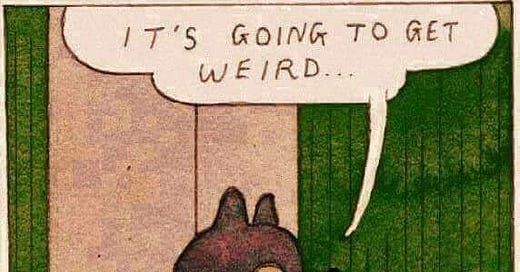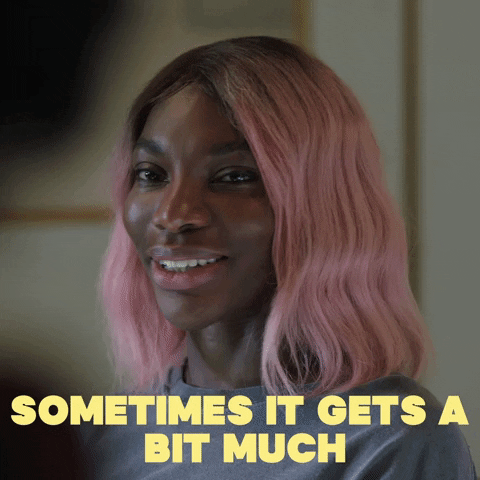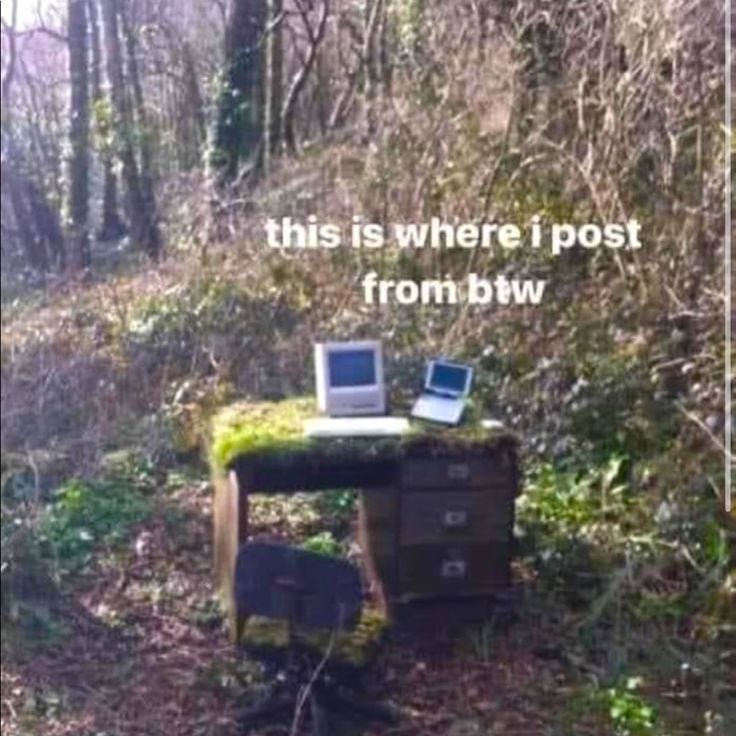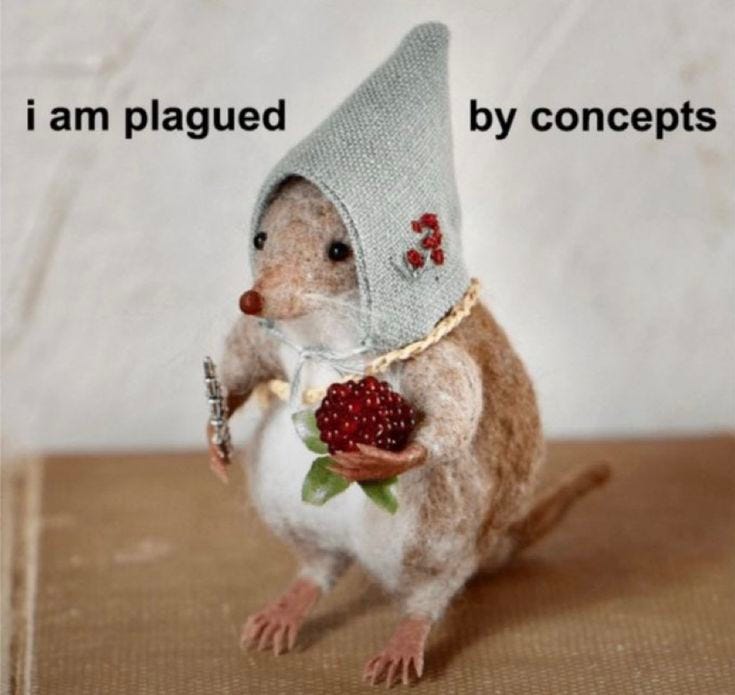A post-prestige era syllabus for the Independent Class
Growth edge tactics, critical thinking practices, and flirty little concepts to spin the flywheel of artistic freedom.
Welcome to the Fringes of Industry!
The place where Ivy League degrees, dad’s connections, and no-strings-attached startup funding from extremist billionaires are the cultural equivalent of having toilet paper stuck to your shoe!
We’re out back, past the gardening tools, at the edge of the parking lot.
Yep! There! Next to the port-a-potties.
We are delighted to have you here. Please take a seat anywhere you can find a spot. It shouldn’t be too hard to find one. Because most likely you’re currently alone! Don’t concern your pretty little head about that. Alone is not the same as lonely. And we’re all friends out here.
If you’re here, it means you’ve gotten past the bouncer separating the haves (lots of prestige!) from the have nots (no prestige wahhh!).
How very clever of you.
To be honest, if you’re cozy in prestigious circles, you probably didn’t even make it to the bouncer. The mere mention of the word “independent” might inflict an eczema outbreak on your back or a cough that makes you sound like a startled goose.
(Indie is not for everyone.)
Today’s meeting is about the topic of prestige (shocker!) and why it must die its final death (sorry!).
For most, prestige does little more than allocate valuable creative willpower toward getting a table at Via Carota or stockpiling Name Drops to bypass formal application processes. Sure, certain kinds of prestige can get you into “development” soirees at the Museum of Natural History, or a backchannel with the daughter of Idaho’s governer1 but prestige is not a substitute for quality.
Good quality is good quality. No matter who has access to it.
Plus, the Prestige Pipeline™ requires tedium.
Plus plus, prestige is unregulated. Everyone disagrees on the metrics.
Plus plus plus, the blind pursuit of prestige steamrolls all potentially fun conversation.
So in order to make life abundantly more interesting, let us dispense with the relics of a bygone prestige-driven era and turn our faces toward the glimmering distant sun of something completely different:
Artistic Freedom!
<cue singing angels>
And for this task, we shall use as a guide a Post-Prestige Era Syllabus for the Independent Class.
This curriculum is Coelian in nature. Micaela Coel(ian). After all, she’s the one who said,
“I have googled “how to write a tv show”. I highly recommend doing that. There’s a lot of information there. And once you’ve taken in that information I think you should just … write.”
Whereas you could spend $83,000 getting a prestigious 2-year MFA in the craft of writing2, to MC’s point, you could also do some googling and try some stuff.
But even if we — Google Search Aficionados hanging out in the parking lot by the portable johns — scoff at prestige, we do love at least one thing we assume accompanies it:
The potential for growth which begets freedom which begets growth which begets freedom which...
You get it!
When we grow, we get better at our art. And when we’re better at our art, we take bigger swings. And when we take bigger swings, we feel the weight of untapped potential breaking into shards and falling to the ground like Juan Soto’s bat from a walk off grand slam during playoffs. And we gain all the swagger of another MC: U can’t touch this!
So if we reject the growth tactics typically reserved for mahogany-designed Elite Academic parlors where Big Brain Intellectuals pat each other’s backs for being Very Smart and Very Well Connected, what can the rest of us use to work on our craft and develop sweet, sweet artistic freedom?
Put another way, what are the next frontiers of growth for independent artists?
Allow me to be so bold:
1. The Articulation of Your Personal Thesis
It’s not enough to play around with a few ideas. Build those ideas into a thesis that evolves year over year. Give us a meandering through line that is decidedly long. Bring us with you as you iterate, and practice articulating new and ever-clarifying arguments for the world you’re building with your art. Don’t be afraid to bring your thesis into everything you make. Own it. Embody it. Let it be the light to which the moths swarm. Tell us your guiding principles! Tell us what you believe!
Required Reading: The War of Art, Letters to a Young Artist, The Artist’s Way, The Art of Asking, Big Magic, What I Talk About When I Talk About Running
Critical Thinking Question: What are the first principles3 you come back to time and again?
2. Crafting Long Term Iterative Collaborations
Single, one-off partnerships are great for growing confidence. But you know what pushes you to your growth edge? Spending a consistent amount of time outside of your comfort zone with new groups of people. Connect with other like-minded artists in a collective setting. Release work together. Complement each other’s creative practices. Share audiences. Place your ideas into a philosophical “collection” together. Practically, you can do this by cross-posting, feed drops, eventizing regularly scheduled programming, teaching each other’s audiences, merch collabs, and so much more. Find the people you love, who love you, where you all add something to each other, and make stuff together for awhile.
Required Reading: And Tomorrow And Tomorrow And Tomorrow, The Fountainhead, The Business of Aspiration, Viewpoints
Critical Thinking Question: Which philosophical collections would you like to be a part of? How would they push you deeper into your work?
3. Establishing a Generalist Daily Practice
Every industry is transforming. And right now there is an abundance to learn by looking at industries outside your own. Pull inspiration and guidance from unlikely sources. If you’re in film, look to fashion branding for distribution ideas. If you’re a novelist, learn the writing techniques of a comedian. If you’re a singer/songwriter, use second hand interior design aesthetics to stage your shows. Your growth edge is most likely not squarely in the center of your current industry. Go get some general knowledge. Make you arts liberal.
Required Reading: Hitmakers: How Brands Influence Culture, The Moon Lists, Free Play, Sapiens, Blood Sweat and Pixels
Critical Thinking Question: What are the patterns you see working from industry to industry? What are the collapses and malfunctions?
4. Catalogue Your Own Canonical Texts
They left some stuff out in school. Read and re-read the texts that are becoming your personal canon. What are the similarities between them? Try to span as many eras as possible. Canonical text could be as highfalutin as Marcus Aurelius or as primary as Oliver Jeffers. There’s no reason Strega Nona can’t be canon if it speaks to you. Defining your canonical texts will give you an encyclopedia of ideas to keep coming back to anew. Believe it or not, you don’t have to read stuff you don’t want to read. You can read whatever you want.
Required Reading: Whatever you want
Critical Thinking Question: What did you decide was true a long time ago? What is true now?
Okay that’s it for today’s meeting. Thank you for coming. There are cheese and crackers on the table over there by the hoses.
Enjoy finding your growth edge on the fringes of industry. There should be enough elbow room out here to get very comfortable, and if you put in a modicum of effort, very brilliant.
See you soon and don’t forget:
We’ll validate your parking!
I have no idea who the Idaho governor is and if they have a daughter, and I’m uninterested in looking this up, so let us continue, unbothered.
Here’s lookin’ at you, Columbia!
From the dictionary: First principles are the fundamental concepts or assumptions on which a theory, system, or method is based.










This is absolutely excellent! I have been pushing for freedom over prestige in my personal philosophy ever since defecting from the art world. So excited to see more writing on this idea! Immediately subscribed.
To the point, thanks! +1 for the concept meme 🙂↕️